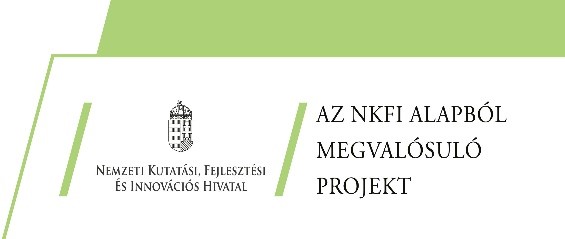A kutatás, fejlesztés, és innováció napjainkban soha nem látott fontossággal bír. Az életstílus változásai és technológiai forradalmak, valamint a COVID-19 pandémia még inkább fókuszba helyezte az innovációt, valamint az innovációs tevékenységeket, ezáltal a KFI projekteket. Azonban az egyes országok innovációs attitűdje nem egyforma. Magyarország kiemelten kezeli az innovációs kezdeményezéseket, ösztönzi, és széleskörű eszköztárral próbálja segíteni azt. De kérdés, hogy minden vállalkozás nyitott az innovációra, tervez az innovációval? Tanulmányunk célja e kérdéskör körbejárása úgy, hogy összehasonlítjuk a magyar vállalkozásokat a Romániában működő társaikkal. Arra vagyunk kíváncsiak az írás során, hogy hogyan vélekednek a mintába bevont vállalkozások a KFI projektekről, hogyan vezetik, menedzselik azokat a projekt-, program-, és portfóliómenedzsment szemszögéből. Tanulmányunkkal rá szeretnék világítani a legfontosabb azonosságokra és különbözőségekre az egymástól való kölcsönös tanulás, valamint az erősségek és gyengeségek feltárása érdekében a két ország példája alapján.
XII. ÉVF. 2024. 1. SZÁM 35-40
DOI: 10.24387/CI.2024.1.6
Cikk megtekintése: http://controllerinfo.hu/wp-content/uploads/2024/08/ContrInf_beliv_2024-01_06.pdf
Köszönetnyilvánítás
A 2019-2.1.11-TÉT-2020-00170 számú projekt a Kulturális és Innovációs Minisztérium Nemzeti Kutatási Fejlesztési és Innovációs Alapból nyújtott támogatásával, a 2019-2.1.11-TÉT pályázati program finanszírozásában valósult meg.

IRODALMI FELDOLGOZÁS
AIGNER, I. – GARAI-FODOR, M. – SZEMERE, T.P. (2022): Singapore’s Journey as a Digit-all-ized and Innovative Smart Nation Toward Sustainability. In: Szakál, A (ed.) IEEE 10th Jubilee International Conference on Computational Cybernetics and Cyber-Medical Systems ICCC 2022, IEEE Hungary Section, pp. 259-264, https://doi.org/10.1109/ICCC202255925.2022.9922714
BACHMANN, P. – FRUTOS-BENCZE, D. (2022): R&D and innovation efforts during the COVID-19 pandemic: The role of universities, Journal of Innovation & Knowledge, 7(4), https://doi.org/10.1016/j.jik.2022.100238
BAJKÓ, N. – FÜLÖP, N. – NAGYNÉ PÉRCSI, K. (2022): Changes in the Innovation- and Marketing-Habits of Family SMEs in the Foodstuffs Industry, Caused by the Coronavirus Pandemic in Hungary. Sustainability, 14(5), 2914, https://doi.org/10.3390/su14052914
BHAGAT, P.R. – NAZ, F. – MAGDA, R. (2022): Role of Industry 4.0 Technologies in Enhancing Sustainable Firm Performance and Green Practices. Acta Polytechnica Hungarica, 19(8), pp. 229-248, https://doi.org/10.12700/APH.19.8.2022.8.13
BLASKOVICS, B. – CZIFRA, J. – KLIMKÓ, G. – SZONTÁGH, P. (2023b): Impact of the Applied Project Management Methodology on the Perceived Level of Creativity. Acta Polytechnica Hungarica, 20(3), pp. 101-120, https://doi.org/10.12700/APH.20.3.2023.3.7
BLASKOVICS, B. – MARKÓ, Z.M. – KLIMKÓ, G. – PAPP-HORVÁTH, V. – CSISZÁRIK-KOCSIR, Á. (2023a): Differences between Public-Sector and Private-Sector Project Management Practices in Hungary from a Competency Point of View. Sustainability, 15(14), 11236, https://doi.org/10.3390/su151411236
CSISZÁRIK-KOCSIR, Á. – DOBOS, O. (2022): Hungarian SMEs’ role and opinion about research, development and innovation projects. In: Szakál, A. (ed.) IEEE 20th Jubilee International Symposium on Intelligent Systems and Informatics (SISY 2022), IEEE Hungary Section, pp. 199-203, https://doi.org/10.1109/SISY56759.2022.10036321
CSISZÁRIK-KOCSIR, Á. – DOBOS, O. (2023): The place and role of research, development and innovation activities in the life of domestic enterprises along business characteristics. In: Szakál, A. (ed.) IEEE 17th International Symposium on Applied Computational Intelligence and Informatics SACI 2023, IEEE Hungary Section, pp. 279-286, https://doi.org/10.1109/SACI58269.2023.10158576
CSISZÁRIK-KOCSIR, Á – VARGA, J. (2023): Innovation and factors leading to innovative behaviour according to Hungarian businesses. In: Szakál, A. (ed.) IEEE 17th International Symposium on Applied Computational Intelligence and Informatics SACI 2023, IEEE Hungary Section, pp. 291-297, https://doi.org/ 10.1109/SACI58269.2023.10158548
DAIM, T.U. – OLIVER, T. AND ISKIN, I. (2013): Research and development (R&D) portfolio management in the electric utility sector: Does it change for the service sector?. Benchmarking: An International Journal, 20(2), pp. 186-211, https://doi.org/10.1108/14635771311307678
DOBOS, O. – CSISZÁRIK-KOCSIR, Á. (2023): Individual-level perception of research, development and innovation in the life of Hungarian enterprises. In: Szakál, A. (ed.) IEEE 17th International Symposium on Applied Computational Intelligence and Informatics, SACI 2023, IEEE Hungary Section, pp. 343-348, https://doi.org/10.1109/SACI58269.2023.10158662
DOCTOR, R.N. – NEWTON, D.P. (2001): A Pearson, Managing uncertainty in research and development, Technovation, 21(2), pp. 79-90, https://doi.org/10.1016/S0166-4972(00)00026-2
EDDOUG, F. – BENABBOU, R. – BENHRA, J. (2023): Adapting P2M Framework for Innovation Program Management Through a Lean-Agile Approach. International Journal of Information Technology Project Management (IJITPM), 14(1), pp. 1-18. https://doi.org/10.4018/IJITPM.318125
EUROPEAN COMISSION (2022): Az EU innovációs teljesítménye a kihívások ellenére tovább javul. Elérhető: https://ec.europa.eu/commission/presscorner/detail/hu/ip_22_5682 (Letöltve: 2023. július 28.)
GARAI-FODOR, M. – VASA, L. – JÄCKEL, K (2023/a): Characteristics of consumer segments based on perceptions of the impact of digitalisation. Decision Making: Applications in Management and Engineering 6(2), pp. 975-993, https://doi.org/10.31181/dmame622023940
GARAI-FODOR, M. – VASA, L – JÄCKEL, K.(2023/b): Characteristics of segments according to the preference system for job selection, opportunities for effective incentives in each employee group. Decision Making: Applications in Management and Engineering 6(2), pp. 557-580, https://doi.org/10.31181/dmame622023761
GARAI-FODOR, M.(2023): Digitalisation trends based on consumer research. In: Szakál, Anikó (ed.) IEEE 17th International Symposium on Applied Computational Intelligence and Informatics SACI 2023,, IEEE Hungary Section, pp. 349-352, https://doi.org/10.1109/SACI58269.2023.10158614
IANCU, A. – POPESCU, L. – VARZARU, A.A. – AVRAM, C.D. (2022): Impact of Covid-19 Crisis and Resilience of Small and Medium Enterprises. Evidence from Romania. Eastern European Economics 60(4), pp. 352-374, https://doi.org/10.1080/00128775.2022.2032177
KARÁCSONY, P. (2021): Relationship between the leadership style and organizational performance in Hungary. Economic Annals-Xxi 190, 5-6(2), pp. 128-135, https://doi.org/10.21003/ea.V190-12
KARÁCSONY, P. – METZKER, Z. – VASIC, T. – KOLTAI, J.P. (2023): Employee attitude to organisational change in small and medium-sized enterprises. E&M, Ekonomie A Management, 26(1), pp. 94-110, https://doi.org/10.15240/tul/001/2023-1-006
KOHLHOFFER-MIZSER, CS. (2017): Mediáció a jogi személyek életében II. – munkaügyi mediáció: a munkaügyi mediáció. In: Csiszárik-Kocsir, Á. (ed.): Vállalkozásfejlesztés a XXI. században: VII. tanulmánykötet, Budapest, ISBN 978-963-449-028-9, pp. 292-302.
KOHLHOFFER-MIZSER, CS. (2016): Mediáció a jogi személyek életében I. In: Csiszárik-Kocsir, Á. (ed.) Vállalkozásfejlesztés a XXI. században VI.: tanulmánykötet Budapest, ISBN 978-615-5460-78-4, pp. 197-210.
NAGY, Sz. – PEREVA, P.G. (2021): Formation of an innovative model of the Hungarian business economy. Marketing of innovations. Innovations in marketing: materials of the International Scientific Internet Conference, Bielsko-Biala, pp. 51-54.
NYIKOS, Gy. – SOHA, B. – BÉRES, A. (2021): Entrepreneurial resilience and firm performance during the COVID-19 crisis – Evidence from Hungary. Regional Statistics 11(3), pp.25-59, https://doi.org/10.15196/RS110307
ONEA, I.A. (2022): Exploring the COVID-19 pandemic impact on innovation and entrepreneurship – Review and evidence from Global Innovation Index. Proceedings of the International Conference on Business Excellence 16(1), pp. 527-544, https://doi.org/10.2478/picbe-2022-0051
RADECKI, J. & SCHONFELD, R. C. (2020): The Impacts of COVID-19 on the Research Enterprise: A Landscape Review, Research Report, https://doi.org/10.18665/sr.314247
VARGA, J. (2017): A szervezetek versenyképességének alapjai: a vállalati versenyképesség erősítésének lehetőségei. In: Csiszárik-Kocsir, Á. (ed.) Vállalkozásfejlesztés a XXI. században: VII. tanulmánykötet Budapest, ISBN 978-963-449-028-9, pp. 725-743,
VARGA, J. (2021): Defining the Economic Role and Benefits of Micro, Small and Medium-sized Enterprises in the 21st Century with a Systematic Review of the Literature. Acta Polytechnica Hungarica, 18(11), pp. 209-228, https://doi.org/10.12700/APH.18.11.2021.11.12
VARGA, J. (2023): Az innováció szerepe és a versenyképességgel való összefüggései. In: Csath, M. – Nagy, B. (ed.): Innovációs sikerfeltételek a kis- és közepes vállalkozások (mkkv-k) körében: 3. kötet. Budapest, ISBN: -, pp. 51-139.
VARGA, J. – CSISZÁRIK-KOCSIR, Á.. (2023): Perception of innovation and innovative projects at user level through the example of the Atala Prism project. In: Szakál, A. (ed.) IEEE 17th International Symposium on Applied Computational Intelligence and Informatics SACI 2023, IEEE Hungary Section, pp. 321-326, https://doi.org/10.1109/SACI58269.2023.10158611
VINICHENKO, M.V. – RYBAKOVA, M.V. – CHULANOVA, O.L. – BARKOV, S.A. – MAKUSHKIN, S.A. – KARÁCSONY, P. (2021): Views on Working with Information in a Semi-Digital Society: Its Possibility to Develop as Open Innovation Culture. Journal Of Open Innovation: Technology Market And Complexity, 7(2)2 Paper: 160, https://doi.org/10.3390/joitmc7020160

